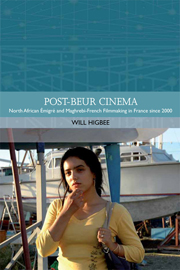Book contents
- Frontmatter
- Contents
- Acknowledgements
- List of Illustrations
- Traditions in World Cinema
- 1 Introduction: From Immigrant Cinema to National Cinema
- 2 The (Maghrebi-)French Connection: Diaspora goes Mainstream
- 3 Colonial Fracture and the Counter-Heritage Film
- 4 Of Spaces and Difference in the Films of Abdellatif Kechiche
- 5 Home, Displacement and the Myth of Return: Journey Narratives in the 2000s
- 6 Screening Islam: cinematic Representations of the Muslim Community in France in the 2000s
- 7 Conclusion: Post-Beur Cinema
- Bibliography
- Index
5 - Home, Displacement and the Myth of Return: Journey Narratives in the 2000s
Published online by Cambridge University Press: 05 October 2013
- Frontmatter
- Contents
- Acknowledgements
- List of Illustrations
- Traditions in World Cinema
- 1 Introduction: From Immigrant Cinema to National Cinema
- 2 The (Maghrebi-)French Connection: Diaspora goes Mainstream
- 3 Colonial Fracture and the Counter-Heritage Film
- 4 Of Spaces and Difference in the Films of Abdellatif Kechiche
- 5 Home, Displacement and the Myth of Return: Journey Narratives in the 2000s
- 6 Screening Islam: cinematic Representations of the Muslim Community in France in the 2000s
- 7 Conclusion: Post-Beur Cinema
- Bibliography
- Index
Summary
Tony Gatlif's award-winning feature film Exils (2004) begins with darkness, followed by a shot of what initially appears to be the contours of an unidentified, barren landscape. As the camera pulls back, the image is in fact revealed to be the naked back of Zano (Romain Duris), the French son of pied noir exiles. The opening scene reaches its chaotic crescendo: Zano surveys the view of the périphérique from the window of his high-rise apartment, before sending a glass of beer crashing to the street below; revolutionary slogans, delivered in Spanish and English to a strident rhythm, boom from the speakers in Zano's room, as Naïma (Lubna Azabal), a young Maghrebi-French woman, lies naked on the bed, devouring a soft cheese, while drumming along to the music with her spoon. This anarchic visual and aural assault on the spectator, which is disorienting and beguiling in equal measure, is brought to a sudden halt as Zano turns to Naïma and says: ‘And what if we went to Algeria?’ Naïma's immediate response to Zano's suggestion is to fall about laughing, so preposterous does this notion of returning to the Maghreb first appear. However, Zano's innocent and playful proposition sets the couple on a meandering, complex and emotionally transformative journey to the Maghreb in search of their very different Algerian roots. It also signals a key strand of Maghrebi-French and North African émigré filmmaking that emerges in the 2000s – that of the journey narrative or road movie which takes its Maghrebi-French protagonists on a ‘return’ to their parents' or grandparents' diasporic homeland.
- Type
- Chapter
- Information
- Post-beur CinemaNorth African Émigré and Maghrebi-French Filmmaking in France since 2000, pp. 130 - 153Publisher: Edinburgh University PressPrint publication year: 2013



